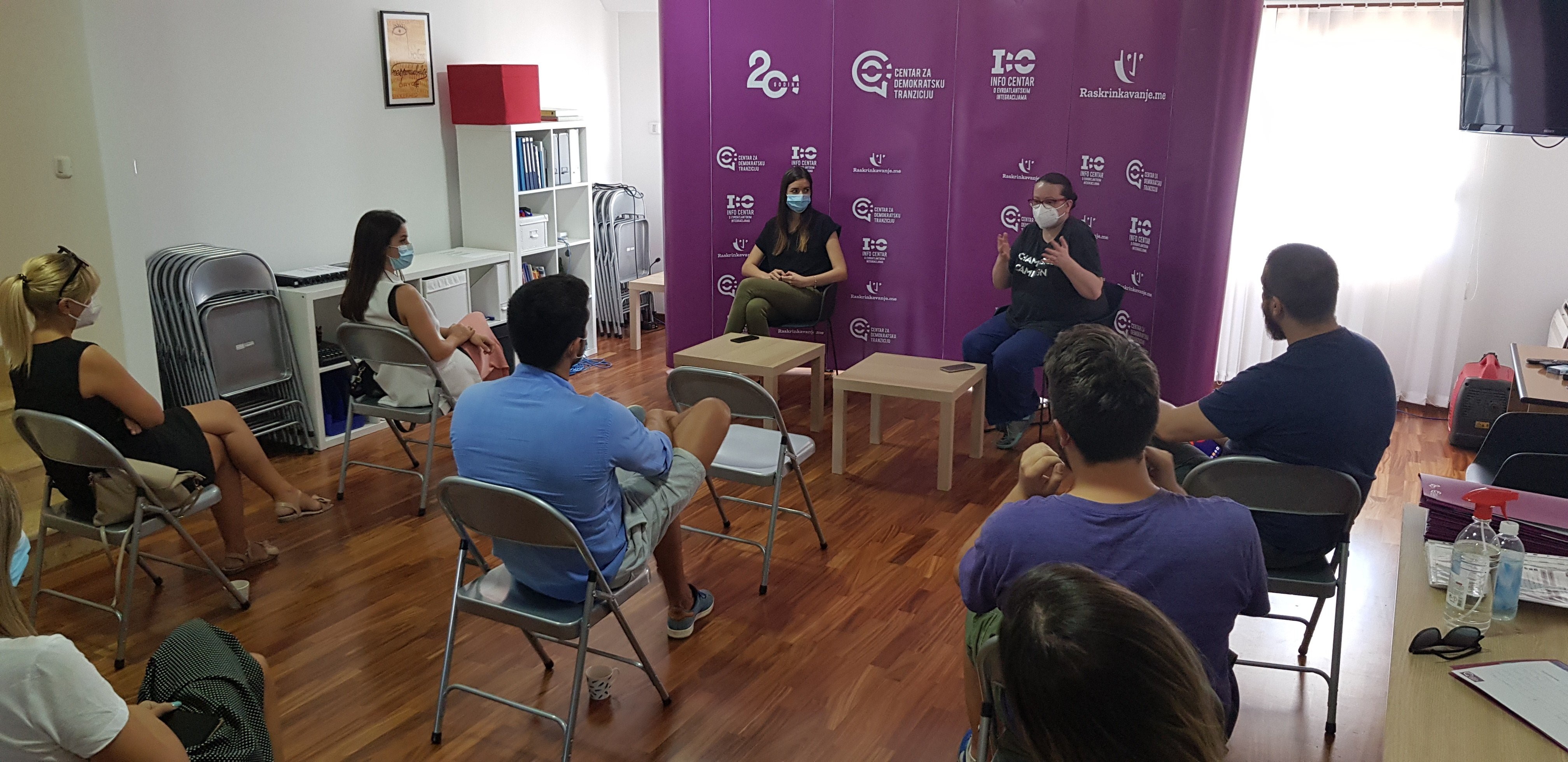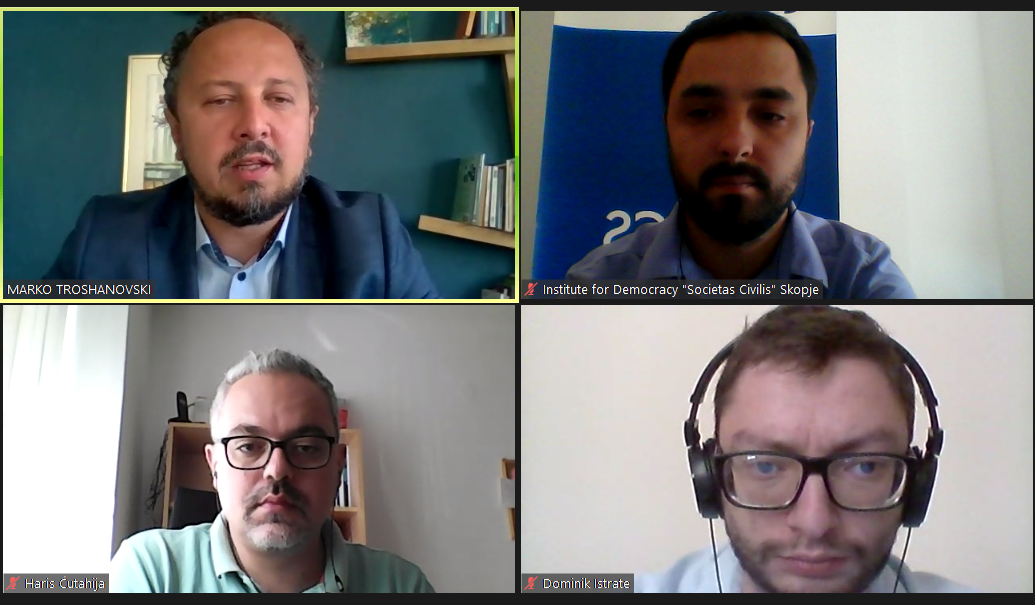As part of our project, Foreign Policy Initiative BH, a Bosnian think tank, conducted a workshop to introduce the findings of the study. Among the participants were Haris Ćutahija, a Researcher of FPI BH, prof. dr. Damir Kapidžić from the Faculty of Political Science at the University of Sarajevo and Strahinja Subotić, a Researcher at the European Policy Centre (CEP), a Serbian-based think tank.
On Tuesday, September 15, 2020, the Foreign Policy Initiative BH organized a presentation of the study “Foreign Authoritarian Influence in the Western Balkans” online through the Zoom platform.
The first part of the presentation was conducted by Haris Ćutahija, one of the authors of the study. Where presented the key findings.
In addition to the author, prof. dr. Damir Kapidžić from the Faculty of Political Science, University of Sarajevo and Strahinja Subotić, a researcher at the Center for European Policies – CEP, both participated in the presentation of the study. Profesor Kapidžić spoke about his views on methodology and recommendations for future research in this field. Researcher Subotić offered a comparative perspective from the region, focusing on specific authoritarian influence in Serbia.
The presentation of the study engaged 34 participants from on Bosnia and Herzegovina and the region, including our associates, representatives of NGOs, embassies, and international organizations.
The implementers of this project, in addition to the Foreign Policy Initiative BH, are Political Capital (Budapest, Hungary); Societas Civilis Institute for Democracy (Skopje, North Macedonia); Center for Democratic Transition (Podgorica, Montenegro), with donor support from the National Endowment for Democracy (NED).
Within the frames of our project, the Center for Democratic Transition (CDT), a Podgorica-based think tank and our Montenegrin partner organization conducted a workshop to introduce the findings of the study, with participants including Dragan Koprivica, the Executive Director of CDT, Milica Kovacevic, the CDT's President, and Milena Gvozdenovic, a co-author of the study and the CDT's research coordinator.
Center for Democratic Transition (CDT) organized the event "Foreign Authoritarian Influence in the Western Balkans – Case of Montenegro" in its premises on Friday, 4th of September 2020.
This event is the closing activity of the project "Understanding and Responding Foreign Malign Influence" that CDT has implemented in cooperation with NGOs Political Capital from Hungary, Institute for Democracy "Societas Civilis" from North Macedonia, and Foreign Policy Initiative from Bosnia and Herzegovina with support of National Endowment for Democracy (NED).
Executive Director of CDT Dragan Koprivica has welcomed the participants and explained that CDT implemented this project with the goal of better understanding and responding to foreign countries' influences in the region.
Research Coordinator Milena Gvozdenovic explained that, within this project, Foreign Authoritarian Influence Index (FAII) was developed in order to quantify the influence of the foreign states, particularly the Russian Federation, the Chinese People's Republic, Turkey, and Gulf states. Gvozdenovic explained that FAII scores range from 1 to 7, where 1 indicates that there is no foreign influence and 7 indicates a pronounced influence of foreign countries. However, according to her explanation, each assessment, according to the FAII methodology, has its own specific explanation and thus more closely represents the level of influence of foreign countries that exists in the country.

Gvozdenovic presented that FAII scores per dimensions are as follows: 6 - Religious soft power and material influence, 5 – Political influence, 5 – Public opinion influencing, 6 – Economic, energy and technology field, 4 – Educational influence.
According to her words these scores indicate the country's vulnerability to the influence of foreign countries.
Gvozdenovic noted that Montenegro has implemented a number of reforms on its European and Euro-Atlantic path, however it is still characterized by weak rule of law and widespread corruption. Both economic and political fragilities made the country more exposed to foreign influences, which may be considered through various spheres.
Gvozdenovic presented the main findings of the FAII report with the focus on political influence, public opinion influence and educational influence.
On the second panel, President of CDT Milica Kovacevic presented the main findings on religious soft power, as well as influence in the economic, energy, and technology fields.
The participants were especially interested in the possibility of the impact of the cooperation that Montenegro has with foreign countries on the process of European integration. Also of particular interest was the construction of a prominent highway project associated with authoritarian influence. Thus the participants commented on the possibilities of further developments of this project, especially having in mind the new circumstances caused by the COVID-19 epidemic.
As part of the project, the Institute for Democracy “Societas Civil” (IDSCS), our Macedonian partner organization, conducted a workshop to introduce our study. Participants included Marko Troshanovski, the President of IDSCS, Haris Ćutahija, a Researcher at the Bosnian think tank Foreign Policy Initiative BH, and Dominik Istrate, an Analyst at Political Capital.
The Institute for Democracy “Societas Civilis” – Skopje (IDSCS) on September 16th, 2020 organized a closed online workshop on the report “Foreign Authoritarian Influence in the Western Balkans” published within the project Foreign Authoritarian Influence Index, conducted by the Political Capital from Hungary, Institute for Democracy “Societas Civilis” from North Macedonia, Foreign Policy Initiative from Bosnia and Hercegovina, the Center for Democratic Transition from Montenegro and the European Values Center for Security Policy from the Czech Republic.
The project measures authoritarian influence by considering political, economic, media, and educational circumstances using accessible datasets in both qualitative and quantitative terms, as well as expert evaluations and interviews.
The report assesses five examined aspects of authoritarian influence: religious soft power and influence via churches, political influence via symbolic politics, influencing political opinion, economic and technological influence, and educational influence. It reports exposure, political attitudes, and receptivity in terms of foreign authoritarian influence. In addition to the country chapters for North Macedonia, Bosnia and Herzegovina, and Montenegro, the report offers a comparative overview and provides policy recommendations.
The panel discussion was opened by Marko Troshanovski, President of Institute for Democracy ‘Societas Civilis’ who expressed the importance of this report in a wider set of efforts conducted by the Institute in addressing processes that have a deteriorating effect on democracy.
Dominik Istrate, an analyst at Political Capital, presented the Foreign Authoritarian Influence Index and the research methodology, and provided a comparative overview.
“In all three examined countries, we have found that there are considerable religious seeking activities given the religious background of the Western Balkans, and this influence seeking is present both in Islamic communities and the Orthodox church. The second area is symbolic politics, where the focus was on relationship building between not just the given country and an authoritarian power but also the ruling party of the given country in the Western Balkans and the authoritarian powers. All three countries were ranked at a level of 5, which serves as a great example of authoritarian influence seeking in the area. Public opinion influencing focuses on media and information campaigns that are predominant regarding politics and society. We also see considerable economic influence building from China and Russia. Education is the only subindex where the influence seeking activities are less visible but still considerable”, said Istrate.

The next speaker Haris Ćutahija, a researcher at Foreign Policy Initiative, emphasized that “for the influences itself there is one important feature of the complicated political system of BiH. Most of the countries that have authoritarian power have an influence only on one of the political entities. They are not able to influence the whole country because, according to the political system, for every major decision, we need complete consensus”, said Ćutahija.
According to the report findings, the authoritarian countries influence various ethnic groups and political representatives considering political influence. Russia influences political representatives of the Bosnian Serbs and they are supporting anti-NATO and anti-Western policies. As an example, he noted that Milorad Dodik, who is currently a member of the country’s presidency, frequently visits Moscow to meet Vladimir Putin and regularly meets with the Russian ambassador in BiH for consultations on every major issue.
Marko Pankovski, a researcher at IDSCS, stressed that in North Macedonia, different actors exercise different means of influence. He emphasized that Russia utilizes asymmetric and cheap measures of influence, mostly disinformation and engagement with fringe political parties. China uses more economic and technological means while Turkey exerts influence in the area of education and religion, especially in the areas of the country with a majority Muslim population.
“If we see a decreased level of disinformation, that doesn’t mean that the overall influence is decreased. The Russian economic activity is decreasing, the disinformation activity is decreasing, and that to a large extent, this is a coincidence with NATO membership of North Macedonia. But this doesn’t mean the Russian influence won’t pop up in a different form. On the other hand, we see an expansion of the potential of Chinese influence, and the experience from the Central and Eastern Europe shows that it comes in waves. It always starts with economic investment, and after that, it goes to political engagements and creating clientelist elites, thus increasing the footprint”, said Pankovski.
During the discussion, the participants were interested in which country has the biggest influence in Bosnia and Hercegovina and some wanted to hear opinions about semi-authoritarian countries within the EU, such as Hungary and Poland.
The participants were interested in the methodology of the report and how have the individual subindexes been constructed. They were also interested in different tools of authoritarian influence described in the report.
The workshop was attended by representatives of institutions, embassies in North Macedonia, advisors within the European Parliament, journalists, and representatives from civil society organizations.